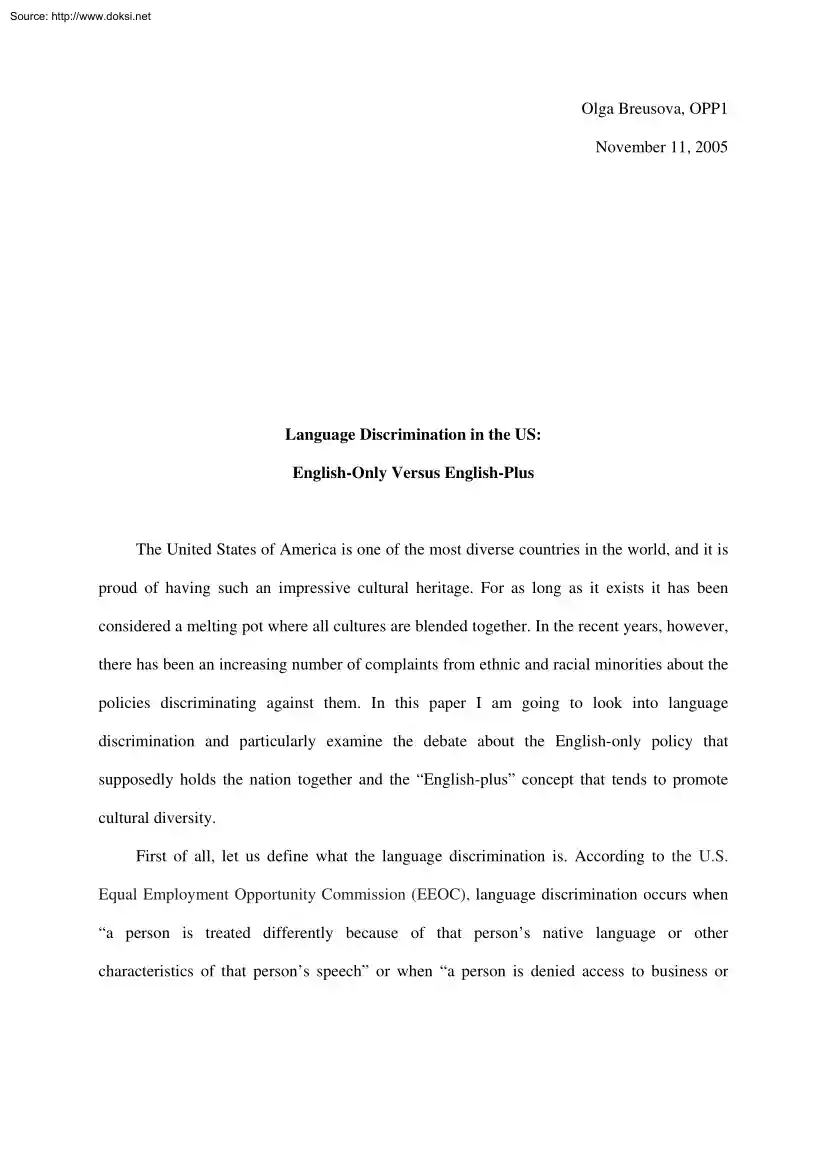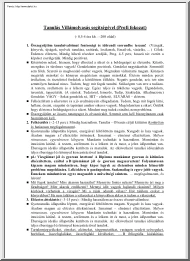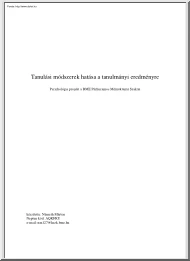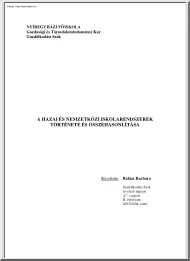Datasheet
Year, pagecount:2006, 7 page(s)
Language:English
Downloads:3
Uploaded:May 07, 2020
Size:486 KB
Institution:
-
Comments:
Attachment:-
Download in PDF:Please log in!
Comments
No comments yet. You can be the first!Content extract
Source: http://www.doksinet Olga Breusova, OPP1 November 11, 2005 Language Discrimination in the US: English-Only Versus English-Plus The United States of America is one of the most diverse countries in the world, and it is proud of having such an impressive cultural heritage. For as long as it exists it has been considered a melting pot where all cultures are blended together. In the recent years, however, there has been an increasing number of complaints from ethnic and racial minorities about the policies discriminating against them. In this paper I am going to look into language discrimination and particularly examine the debate about the English-only policy that supposedly holds the nation together and the “English-plus” concept that tends to promote cultural diversity. First of all, let us define what the language discrimination is. According to the US Equal Employment Opportunity Commission (EEOC), language discrimination occurs when “a person is treated differently
because of that person’s native language or other characteristics of that person’s speech” or when “a person is denied access to business or Source: http://www.doksinet 2 government services because he or she does not speak English.” 1 Although there are no laws against language discrimination as such, it is considered by most courts to be a form of discrimination on the basis of the national origin, which is prohibited by well-established civil rights laws such as Titles VI and VII of the Civil Rights Act of 1964 (a federal law). Other laws, such as the federal Civil Rights Act of 1866, may also be applied to such discrimination. 2 The English-only activism has its roots in 1980’s when the nation started contemplating the status of English and 23 states declared English to be their official language. According to James Crawford, the idea to restrict the use of minority languages had never been proposed on the federal level before 1981. In 1996, for the first time,
Congress voted on and the House of Representatives approved a bill designating English as the federal government’s sole language of official business. 3 Apparently, the targets of the English-only movement were linguistic minorities, bilingual educators and Indian tribes who immediately started feeling discriminated against. James Crawford pointed out several arguments that the English-only activists use. First of all, the proponents of the English-only policy argue that English, being the most successful and dominant language in history, has been “social glue” in the United States, which has allowed Americans of diverse backgrounds understand each other and overcome differences. Because of government-sponsored bilingual programs new immigrants are reluctant to learn English and even their children are not forced to do so with bilingual education available. Ethnic leaders might promote this concept because they can provide jobs for the members of their ethnic minority and keep
them dependant by discouraging from learning English. 1 http://www.eeocgov/origin/indexhtml same 3 Anatomy of the English-only movement. James Crawford Conference University of Illinois at UrbanaChampaign, March 21, 1996 2 Source: http://www.doksinet 3 Meanwhile, language diversity is allegedly dangerous for the whole nation because it leads to ethnic hostility, language conflict and political separatism like in Quebec. The representative Toby Roth said at the discussion of the "English Language Empowerment Act of 1996" in the House of Representatives on August 1, 1996, “In America, we have always had the idea that we are the melting pot, that we are all the same. We do not believe in hyphenated Americans. We are all equal Americans America must continue to be the melting pot. A Nation like America cannot be made up of groups America is made up of individuals. As Woodrow Wilson said, as long as you consider yourself a part of a group, you are still not assimilated into
American society, because America, like other nations, is made up of individuals and not made up of groups.” 4 In the beginning of 90’s a lot of American businesses started adopting the English-only policies aimed at restricting the use of languages other than English at working places. A notorious example, described by Chicago Tribune, is Watlow Electric Manufacturing Co. in Batavia, which implemented an English-only policy in August 1997 and asked employees to sign a statement agreeing not to speak Spanish at work. Medina, a Spanish-speaking worker from Argentina, called it an insult. He refused to sign and was fired "It was easier to use Spanish. Wed do a better job if we spoke in Spanish, because the person in charge of the line spoke Spanish," said Medina, 33, from Chicago. "We just used English to speak with the boss." 5 “The difficulty with speaking two languages interchangeably is called "code switching." It can be very difficult for people
to go back and forth, said Donya Fernandez, who specializes in language rights for the Employment Law Center of the Legal Aid Society in San Francisco. "Every time before they open their mouths, they have to stop and think what 4 Debate on English-only Legislation. Aug 1996 A new language barrier: more businesses are requiring English to be spoken on the job. T Shawn Taylor Chicago Tribune. 2001 5 Source: http://www.doksinet 4 theyre going to say," Fernandez said. Medina simply applied a fairness test to reach his own conclusion. "Why was English so important? I never really understood why they did that” 6 According to Chicago Tribune, in 1996, when the EEOC began tracking language complaints, there were 91 charge filings. That number rose to 443 in 2001 “While the EEOC has made English-only policies an agenda item in the last five years, the commission doesnt flat-out reject them. EEOC guidelines state that English-only rules are lawful if theyre limited to
work-related duties and justified by business necessity.” 7 No doubt that nowadays there are hundreds of companies and agencies in the US that operate using the English-only policy with no complaints. Such complaints, however, seldom make it to court. It is impossible to track how many workers are negatively impacted by these policies. Many are immigrants in low-wage, low-skilled jobs who do not know their rights or undocumented workers afraid to come forward. LULAC (League of United Latin American Citizens) is the organization that advocates the rights of such people and promotes the so-called “English-Plus” concept, which “celebrates the cultural and linguistic diversification of America and treats this nations multiethnic and multilingual communities as national resources”. The official LULAC website says that a great number of politicians and community leaders have already endorsed the "English Plus Concept" because “it states that although young people of
limited English proficiency "need and want to be fluent in English to enter into the mainstream of this nation, they have much to offer from their diversified languages and cultural backgrounds." These national and natural resources must be protected and celebrated.” 8 The "English Plus Concept" promotes the learning of a second language in addition to ones mother tongue because "additive bilingualism creates a language competent society", in 6 same A new language barrier: more businesses are requiring English to be spoken on the job. T Shawn Taylor Chicago Tribune. 2001 8 LULAC, English Plus Versus English-Only. wwwlulacorg/publicahtml 7 Source: http://www.doksinet 5 which both limited English proficient individuals and native English speakers will be able to develop fluency in a second language. James Crawford states that “about 175 indigenous languages survive in the United States today, according to the best documented estimate, perhaps half
the number spoken when Europeans first arrived. Yet only about twenty of these are still being learned by children. Absent an ambitious effort to preserve them, the rest seem doomed to extinction within two or three generations. Research on second-language acquisition has increasingly showcased the academic benefits of bilingual instruction. Indeed, when language-minority students fail, it is more likely from too little instruction in their native language than too little English. Along-term national study (Ramírez et al, 1991) has documented higher student achievement in developmental bilingual classrooms than in transitional bilingual or structured English immersion classrooms." 9 According to Chicago Tribune, bilingual/bicultural individuals internalize that just like there are two ways to say the same thing, there are two ways to learn new things or solve problems. Bilingual students develop a mental agility and flexibility about learning that monolinguals lack. This
flexibility is vital in todays world, where employees are constantly expected to acquire new skills to stay abreast of technological changes. Standardized tests confirm the intellectual advantage of students educated in two languages. A 14-year study by researchers at George Mason University found that students in dual-language schools that teach half the day in one language and the other half in a second language did better than students in other types of bilingual education programs and also outperformed native English speakers in English-only schools. A study conducted by researchers at the University of Miami reveals that linguistic knowledge among Hispanic families drastically affects family income. Families who spoke 9 Anatomy of the English-only movement. James Crawford Conference University of Illinois at UrbanaChampaign, March 21, 1996 Source: http://www.doksinet 6 only Spanish had an average income of $ 18,000; those with only English, $32,000; and those with Spanish and
English, $50,376. The figures were culled from 1990 census figures 10 Although English and Spanish bilingualism may be easiest to achieve and most desirable, the practical and intellectual benefits of bilingualism may be reached with another language. French, Japanese or some other language could easily take the place of Spanish in some parts of the country. A very logical conclusion is that knowing only English in today’s severely competitive society is not enough so bilingual education is to be developed. Without any doubt, limited English proficient persons need to be encouraged not discriminated. As Senator Domenici stated before the Senate in September 1985, English (Only) Language Amendment will not help anyone learn the English language It will not lead to a cohesive nation. In fact, it will create a more divided nation. This proposed amendment is an insult to all Americans for whom English is not the first language now at this stage of their life and to all those Americans
who would like to learn English but who cannot for one reason or another." 11 No one in the United States questions that English is already the official language of the country. Encouraging the citizens to be actively bilingual will help the nation not only avoid language discrimination but also preserve its cultural and linguistic heritage. 10 11 Spanish for all? The case for bilingual education. Domenico Maceri Chicago Tribune: April 15, 1999 pg 27 English Plus Versus English Only. LULAC wwwlulacorg/publicahtml Source: http://www.doksinet 7 Works Cited: Anatomy of the English-only movement. James Crawford Conference University of Illinois at Urbana-Champaign, March 21, 1996 http://ourworld.compuservecom/homepages/JWCRAWFORD/homehtm EEOC official web-site http:/www.eeocgov/origin/indexhtml English Plus Versus English Only. LULAC official web-site www.lulacorg/publicahtml Debate on English-only Legislation. Transcript of the debate Aug 1996
http://www.humnetuclaedu/humnet/linguistics/people/grads/macswan/debatehtm A new language barrier: More businesses are requiring English to be spoken on the job; [Chicagoland Final Edition] T Shawn Taylor, Tribune staff reporter. Chicago Tribune” Jun 10, 2001. pg 1 Speaking Two Languages, Both English. William RaspberryThe Washington Post: Aug 20, 2001. pg A15 Spanish for all? The case for bilingual education. Domenico Maceri Chicago Tribune: April 15, 1999. pg 27 Watlow Is Sued Over "English Only" Rule. Stamborski, Al St Louis Post - Dispatch: Mar 12, 1999. pg C1
because of that person’s native language or other characteristics of that person’s speech” or when “a person is denied access to business or Source: http://www.doksinet 2 government services because he or she does not speak English.” 1 Although there are no laws against language discrimination as such, it is considered by most courts to be a form of discrimination on the basis of the national origin, which is prohibited by well-established civil rights laws such as Titles VI and VII of the Civil Rights Act of 1964 (a federal law). Other laws, such as the federal Civil Rights Act of 1866, may also be applied to such discrimination. 2 The English-only activism has its roots in 1980’s when the nation started contemplating the status of English and 23 states declared English to be their official language. According to James Crawford, the idea to restrict the use of minority languages had never been proposed on the federal level before 1981. In 1996, for the first time,
Congress voted on and the House of Representatives approved a bill designating English as the federal government’s sole language of official business. 3 Apparently, the targets of the English-only movement were linguistic minorities, bilingual educators and Indian tribes who immediately started feeling discriminated against. James Crawford pointed out several arguments that the English-only activists use. First of all, the proponents of the English-only policy argue that English, being the most successful and dominant language in history, has been “social glue” in the United States, which has allowed Americans of diverse backgrounds understand each other and overcome differences. Because of government-sponsored bilingual programs new immigrants are reluctant to learn English and even their children are not forced to do so with bilingual education available. Ethnic leaders might promote this concept because they can provide jobs for the members of their ethnic minority and keep
them dependant by discouraging from learning English. 1 http://www.eeocgov/origin/indexhtml same 3 Anatomy of the English-only movement. James Crawford Conference University of Illinois at UrbanaChampaign, March 21, 1996 2 Source: http://www.doksinet 3 Meanwhile, language diversity is allegedly dangerous for the whole nation because it leads to ethnic hostility, language conflict and political separatism like in Quebec. The representative Toby Roth said at the discussion of the "English Language Empowerment Act of 1996" in the House of Representatives on August 1, 1996, “In America, we have always had the idea that we are the melting pot, that we are all the same. We do not believe in hyphenated Americans. We are all equal Americans America must continue to be the melting pot. A Nation like America cannot be made up of groups America is made up of individuals. As Woodrow Wilson said, as long as you consider yourself a part of a group, you are still not assimilated into
American society, because America, like other nations, is made up of individuals and not made up of groups.” 4 In the beginning of 90’s a lot of American businesses started adopting the English-only policies aimed at restricting the use of languages other than English at working places. A notorious example, described by Chicago Tribune, is Watlow Electric Manufacturing Co. in Batavia, which implemented an English-only policy in August 1997 and asked employees to sign a statement agreeing not to speak Spanish at work. Medina, a Spanish-speaking worker from Argentina, called it an insult. He refused to sign and was fired "It was easier to use Spanish. Wed do a better job if we spoke in Spanish, because the person in charge of the line spoke Spanish," said Medina, 33, from Chicago. "We just used English to speak with the boss." 5 “The difficulty with speaking two languages interchangeably is called "code switching." It can be very difficult for people
to go back and forth, said Donya Fernandez, who specializes in language rights for the Employment Law Center of the Legal Aid Society in San Francisco. "Every time before they open their mouths, they have to stop and think what 4 Debate on English-only Legislation. Aug 1996 A new language barrier: more businesses are requiring English to be spoken on the job. T Shawn Taylor Chicago Tribune. 2001 5 Source: http://www.doksinet 4 theyre going to say," Fernandez said. Medina simply applied a fairness test to reach his own conclusion. "Why was English so important? I never really understood why they did that” 6 According to Chicago Tribune, in 1996, when the EEOC began tracking language complaints, there were 91 charge filings. That number rose to 443 in 2001 “While the EEOC has made English-only policies an agenda item in the last five years, the commission doesnt flat-out reject them. EEOC guidelines state that English-only rules are lawful if theyre limited to
work-related duties and justified by business necessity.” 7 No doubt that nowadays there are hundreds of companies and agencies in the US that operate using the English-only policy with no complaints. Such complaints, however, seldom make it to court. It is impossible to track how many workers are negatively impacted by these policies. Many are immigrants in low-wage, low-skilled jobs who do not know their rights or undocumented workers afraid to come forward. LULAC (League of United Latin American Citizens) is the organization that advocates the rights of such people and promotes the so-called “English-Plus” concept, which “celebrates the cultural and linguistic diversification of America and treats this nations multiethnic and multilingual communities as national resources”. The official LULAC website says that a great number of politicians and community leaders have already endorsed the "English Plus Concept" because “it states that although young people of
limited English proficiency "need and want to be fluent in English to enter into the mainstream of this nation, they have much to offer from their diversified languages and cultural backgrounds." These national and natural resources must be protected and celebrated.” 8 The "English Plus Concept" promotes the learning of a second language in addition to ones mother tongue because "additive bilingualism creates a language competent society", in 6 same A new language barrier: more businesses are requiring English to be spoken on the job. T Shawn Taylor Chicago Tribune. 2001 8 LULAC, English Plus Versus English-Only. wwwlulacorg/publicahtml 7 Source: http://www.doksinet 5 which both limited English proficient individuals and native English speakers will be able to develop fluency in a second language. James Crawford states that “about 175 indigenous languages survive in the United States today, according to the best documented estimate, perhaps half
the number spoken when Europeans first arrived. Yet only about twenty of these are still being learned by children. Absent an ambitious effort to preserve them, the rest seem doomed to extinction within two or three generations. Research on second-language acquisition has increasingly showcased the academic benefits of bilingual instruction. Indeed, when language-minority students fail, it is more likely from too little instruction in their native language than too little English. Along-term national study (Ramírez et al, 1991) has documented higher student achievement in developmental bilingual classrooms than in transitional bilingual or structured English immersion classrooms." 9 According to Chicago Tribune, bilingual/bicultural individuals internalize that just like there are two ways to say the same thing, there are two ways to learn new things or solve problems. Bilingual students develop a mental agility and flexibility about learning that monolinguals lack. This
flexibility is vital in todays world, where employees are constantly expected to acquire new skills to stay abreast of technological changes. Standardized tests confirm the intellectual advantage of students educated in two languages. A 14-year study by researchers at George Mason University found that students in dual-language schools that teach half the day in one language and the other half in a second language did better than students in other types of bilingual education programs and also outperformed native English speakers in English-only schools. A study conducted by researchers at the University of Miami reveals that linguistic knowledge among Hispanic families drastically affects family income. Families who spoke 9 Anatomy of the English-only movement. James Crawford Conference University of Illinois at UrbanaChampaign, March 21, 1996 Source: http://www.doksinet 6 only Spanish had an average income of $ 18,000; those with only English, $32,000; and those with Spanish and
English, $50,376. The figures were culled from 1990 census figures 10 Although English and Spanish bilingualism may be easiest to achieve and most desirable, the practical and intellectual benefits of bilingualism may be reached with another language. French, Japanese or some other language could easily take the place of Spanish in some parts of the country. A very logical conclusion is that knowing only English in today’s severely competitive society is not enough so bilingual education is to be developed. Without any doubt, limited English proficient persons need to be encouraged not discriminated. As Senator Domenici stated before the Senate in September 1985, English (Only) Language Amendment will not help anyone learn the English language It will not lead to a cohesive nation. In fact, it will create a more divided nation. This proposed amendment is an insult to all Americans for whom English is not the first language now at this stage of their life and to all those Americans
who would like to learn English but who cannot for one reason or another." 11 No one in the United States questions that English is already the official language of the country. Encouraging the citizens to be actively bilingual will help the nation not only avoid language discrimination but also preserve its cultural and linguistic heritage. 10 11 Spanish for all? The case for bilingual education. Domenico Maceri Chicago Tribune: April 15, 1999 pg 27 English Plus Versus English Only. LULAC wwwlulacorg/publicahtml Source: http://www.doksinet 7 Works Cited: Anatomy of the English-only movement. James Crawford Conference University of Illinois at Urbana-Champaign, March 21, 1996 http://ourworld.compuservecom/homepages/JWCRAWFORD/homehtm EEOC official web-site http:/www.eeocgov/origin/indexhtml English Plus Versus English Only. LULAC official web-site www.lulacorg/publicahtml Debate on English-only Legislation. Transcript of the debate Aug 1996
http://www.humnetuclaedu/humnet/linguistics/people/grads/macswan/debatehtm A new language barrier: More businesses are requiring English to be spoken on the job; [Chicagoland Final Edition] T Shawn Taylor, Tribune staff reporter. Chicago Tribune” Jun 10, 2001. pg 1 Speaking Two Languages, Both English. William RaspberryThe Washington Post: Aug 20, 2001. pg A15 Spanish for all? The case for bilingual education. Domenico Maceri Chicago Tribune: April 15, 1999. pg 27 Watlow Is Sued Over "English Only" Rule. Stamborski, Al St Louis Post - Dispatch: Mar 12, 1999. pg C1





 Just like you draw up a plan when you’re going to war, building a house, or even going on vacation, you need to draw up a plan for your business. This tutorial will help you to clearly see where you are and make it possible to understand where you’re going.
Just like you draw up a plan when you’re going to war, building a house, or even going on vacation, you need to draw up a plan for your business. This tutorial will help you to clearly see where you are and make it possible to understand where you’re going.